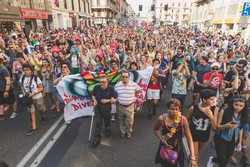The polymorphism of LGBT activism in Italy
What are the critical concepts that facilitate understanding of how LGBT movements operate in the political field? How do these movements exercise and contemplate their strategies? These are some of the questions the EU-funded LGBT ACT (Minority politics, social movements and equal rights: the Italian inter-associative LGBT activism) project sought to answer. By working on the notion of “activist resilience”, LGBT ACT studied the paradoxes found in Italy where strong opposition does not allow Italian Parliament to advance the LGBT movement in terms of rights. However, a predominantly homophobic environment has not prevented the development of an LGBT inter-associative network. Fieldwork consisted of observation and interviews which allowed for a clearer view of activist interactions when creating national and local strategies. This was a way to make sense of the conflicts between different organizations in terms of leadership involved in Italian movements. The work showed the dominant Italian mainstream LGBT activism as well as the opposition from the “antagonistic” activism. Using a comparative approach with the situation in France, researchers highlighted the problems of trans-nationalisation of LGBT activism. The LGBT movement in France over the past 20 years has created a strong unitary structure of LGBT activism. In Italy, it is the resistant Italian political arena with regard to LGBT rights that has created a strong formation of LGBT activism in the country. This multidimensional model permits the enrichment of European literature on gender and sexuality political studies and can lead to the consideration of LGBT politics as legal and complex field. It is one which spans three key dimensions. These include minority politics, social movement and equal rights. Results of the research and related activities were published and disseminated. This has led to the introduction of LGBT politics in the Italian academic field. It also can help promote a public debate of LGBT rights in Italy. More broadly the work has helped the scientific community to understand the activist LGBT field in Italy and the complexities of the movement.







